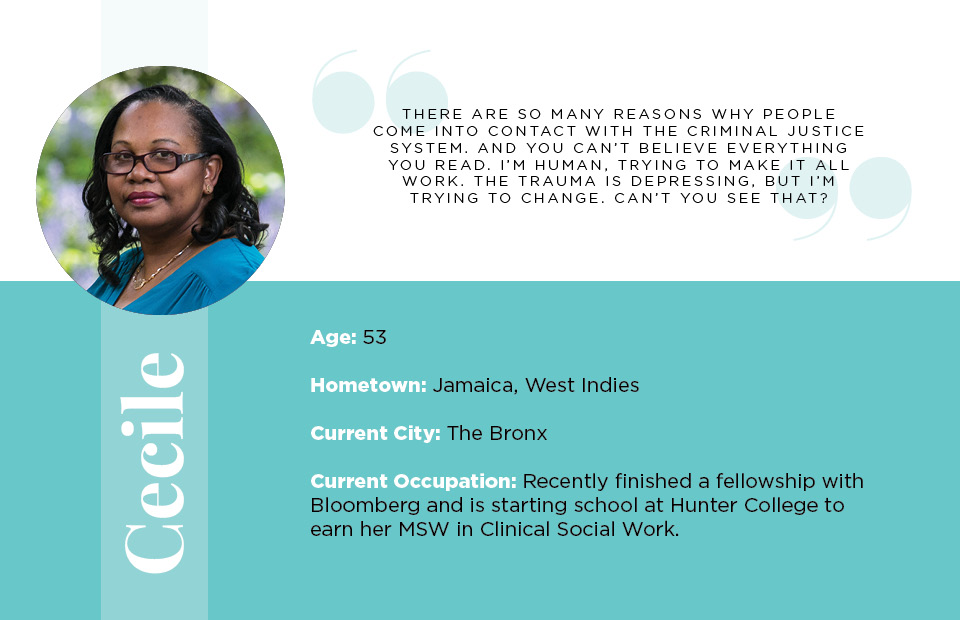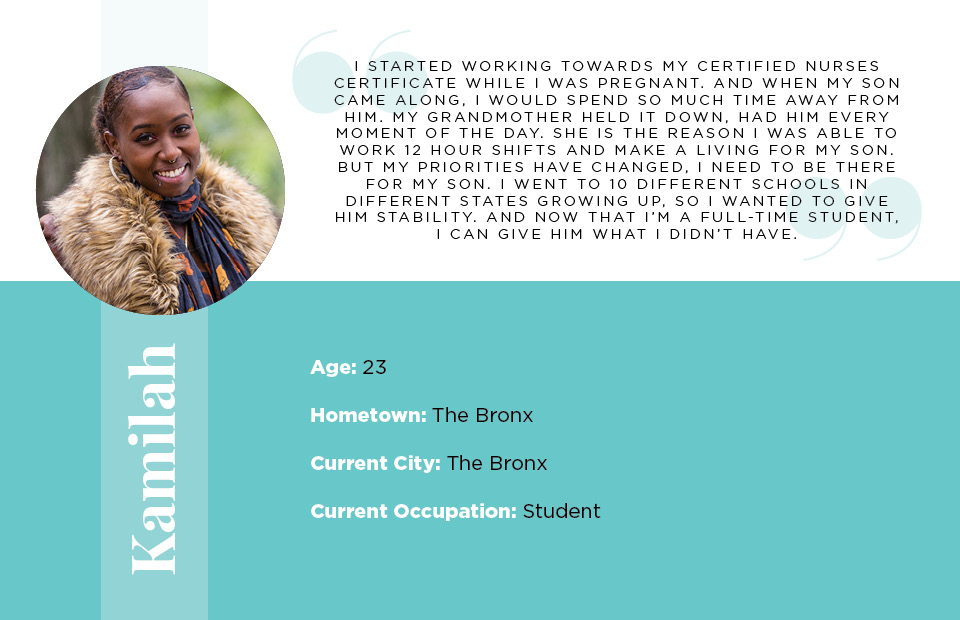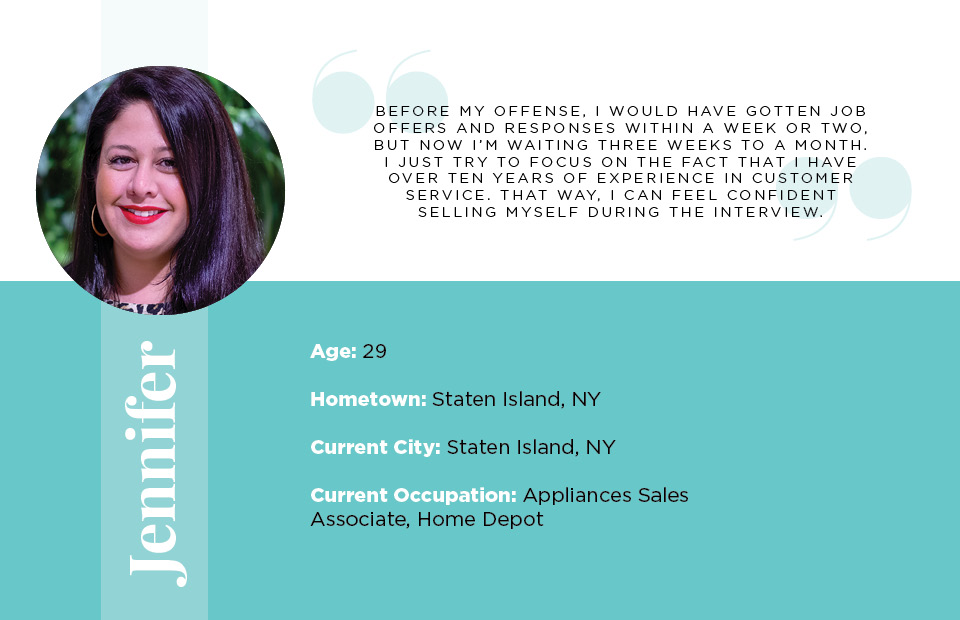Re-entering the workplace after taking time off is difficult.
I know from personal experience —though not exactly my own. My mom was a full-time stay-at-home mom for nearly 13 years when I was growing up, a decision that I learned about in depth
when I interviewed her earlier this year. Stories about women defying the odds and doing the unthinkable, such as joining the workforce after unforeseen or longer-than-planned time off, is inspiring beyond words.
Women are tenacious and capable of anything. And that’s exactly why, when Diana McHugh, Director of Communications at
New York’s Women's Prison Association (WPA), contacted me about interviewing women who had been previously incarcerated to learn about their experiences reentering the workplace, I jumped at the opportunity.
At first, I was nervous to speak with these women. With a topic that is equal parts taboo and critical to discuss, I wanted to tell their stories perfectly. And then I realized—it’s not my responsibility to tell their stories, because their stories stand for themselves. Just like you and me, these women are committed to finding their dream careers and crafting a life that they’ve always envisioned.
Let's Talk About The Issue
My lack of knowledge of the criminal justice system led me to learn more about the resources out there for those looking to re-enter the workplace.
WPA, for example, works with women at all stages of criminal justice involvement. They help women achieve what is most important to them—finding safe and affordable housing, preparing for job interviews, reuniting with their children, gaining peer support from other women, learning household budgeting and skills for daily life, and much more. It’s organizations and companies like WPA that are working to change the stigma.
A recent analysis by the Prison Policy Initiative shows that “formerly incarcerated people are unemployed at a rate of over 27 percent” which is “higher than the total U.S. unemployment rate during any historical period, including the Great Depression.” Compounding the issue, while employers express an
openness to hire people with criminal records, evidence shows that having a record cuts employer callback
rates in half. And because that's not enough already, the problem is worse for women of color. Previously incarcerated black women experience higher unemployment rates (37 percent higher than the general population,) than white men, who have the lowest (14 percent.)
The Interviews
I spoke with Cecile, Kamilah, and Jennifer to learn about their experiences in the workplace post-incarceration. We covered the hardships they’re overcoming, the successes they’ve achieved, and why workplace culture needs to make room for diversity. We can all learn from their stories—previously incarcerated or not—because once we start listening to each other and open our minds, we can start making real change.
INTERVIEWEE: CECILE
When I first learned about Cecile’s recent accomplishments, I was floored. She’s completed a 16-week fellowship with Bloomberg, in which she learned the intricate ins-and-outs of the catering business, and is gearing up to start school at Hunter College to receive her Master’s in Social Work (MSW) in Clinical Social Work. All at the age of 53. And she’s not stopping there—with the dream of starting her own restaurant one day, she has her eyes set on a very bright future.
Big Dreams + Pushing Past Stigma
“The [fellowship] experience was really eye-opening. I was getting managerial experience, being hands-on in the kitchen, and making sure the customers were satisfied. I miss being in that environment because it was so fast-paced. Taking the train at 2 a.m. or 3 a.m. didn’t bother me, I just always wanted to be there. You felt wanted, like you’re a part of a real team. I still keep in touch with some of the managers as they try to connect me to other opportunities,” Cecile details. “For me, it was broadening my want to open my own restaurant. I do still have that drive to open my restaurant, a Caribbean cuisine with different tastes from different countries.”
Before Cecile’s positive experience in her fellowship, the road wasn’t always easy. Adjusting back to the workplace after being incarcerated was difficult, and she continues to grapple with the stigma that many believe.
“There have been a lot of barriers because of the stigma with people who have criminal justice involvement. I do well in interviews, but [my criminal justice involvement] just comes out as part of my history. When I’m offered a job and they say they can no longer employ me because of my background—that, for me, is saying that people need to be more educated,” Cecile explains. “There are so many reasons why people come into contact with the criminal justice system. And you can’t believe everything you read. I’m human, trying to make it all work. The trauma is depressing, but I’m trying to change. Can’t you see that?"
"There have been a lot of barriers because of the stigma with people who have criminal justice involvement. I do well in interviews, but [my criminal justice involvement] just comes out as part of my history. When I’m offered a job and they say they can no longer employ me because of my background—that, for me, is saying that people need to be more educated."
By focusing on her unique skills and passion for engaging in her local community, Cecile is also furthering her education to explore an area that she loves: social work.
Second Chances + Social Work
“I have over 12 years of work in social work, which is why I wanted to go back to school for it. I loved that work, it comes really naturally to me. At first, I was nervous because Hunter College has a really good program, and I so eagerly wanted to get in,” Cecile recalls. “While I was in my last year of high school, my church group had a program where we would volunteer to help people in need. Assessing those need and reporting back to the agency, I loved it. I’ve held that memory with me all these years.”
Taking her experience with Bloomberg and combining that with her passion for social work, Cecile recently started a new job as a Case Manager for the Women’s Homeless Shelter. Yes, this woman does it all. “I’m so happy. This is my thing. This is what I want to do,” Cecile rejoices. “I interviewed with the director in the Brooklyn office, and what they offered me in salary wasn’t a lot. But I was willing to take whatever they offered. For me, it’s more about the opportunity to get my foot in the door and getting that second chance. This agency gave me a second chance.”
Cecile was my first interview of this series, and she truly set the bar for what real, authentic tenacity looks like in a professional woman. I think we can all wish her the best of luck as she grows in social work (and maybe anticipate trying her first dish at the restaurant).
INTERVIEWEE: KAMILAH
Interviewing Kamilah hit a particular cord with me. Mere months separate us in age, yet our life experiences have been drastically different. With a sense of humor like nothing I’ve never heard before, and a unique approach to handling the trials and tribulations life has thrown her way, Kamilah is a powerful force in this world.
Giving Back + Lifting Others Up
She’s currently working towards her associate’s degree and has an internship she loves. Kamilah is not formerly incarcerated, but rather “justice-involved,” because she completed JusticeHome, an alternative to a traditional incarceration program run by WPA that works to keep women out of prison.
“My work at [my internship] speaks to what I want to do career-wise. I help co-facilitate summer programs, like Emerging Girls. It was the first time they’d ever done a summer program, and I was given a lot of responsibility,” Kamilah explains. “It’s all very healing-centered, since we’re working with young women who have experienced sexual harassment. I basically planned a flea market for the girls to sell their own crafts and goods in order to encourage entrepreneurship. I was their big sister, their shadow, helping them every step of the way.”
"Being a black woman in America is constantly telling my truth, and no one believing me. We feel like a nuisance. So I would encourage all women, myself included, to know your rights. Do your own research. Read your own articles. Educate yourself."
In addition to the work she was doing with the summer programs at her internship, Kamilah also coordinates Sister Circles, which are weekly meetings that create a safe space for women to connect over their experiences.
Sister Circles + Safe Spaces
“My Thursday nights are for Sister Circles. We pick a topic and talk about it within the group, and it’s a great group bonding experience between black women,” Kamilah explains. “I’m in charge of helping my supervisors determine the topic for the night, cook dinner, choose an activity, and find the right resources. It’s all very spiritually centered and trauma-informed—we want to make a safe space for these women to come together to talk about what unsettles them, what they’ve been through, and anything that might be useful for them.”
Kamilah’s passion for mental health and helping others is evident in her career decisions. In addition to her professional responsibilities, she is also a mother of a five-year-old son. I wanted to know if her outlook on career changed when she became a mother.
Growth + Motherhood
“Before my criminal justice involvement, I was studying to be a nurse. But after my involvement, I was no longer able to pursue that career. Which I’m actually pretty OK with—I started working towards my Certified Nurses Certificate while I was pregnant. And when my son came along, I would spend so much time away from him,” Kamilah recalls. “My grandmother held it down, had him every moment of the day. She is the reason I was able to work 12-hour shifts and make a living for my son. But my priorities have changed, I need to be there for my son. I went to 10 different schools in different states growing up, so I wanted to give him stability. And now that I’m a full-time student, I can give him what I didn’t have.”
With a goal to become an educator of Urban Black Psychology, Kamilah knows that “whatever [she] decides to do for permanent career choices, it’s going to be black women-centered and something in reform.” And the best way she’s going to get there? “Being a black woman in America is constantly telling my truth, and no one believing me. We feel like a nuisance. So I would encourage all women, myself included, to know your rights. Do your own research. Read your own articles. Educate yourself,” Kamilah advises.
INTERVIEWEE: JENNIFER
Currently working at Home Depot, Jennifer is navigating some of the barriers to employment as a result of her incarceration, particularly when it comes to finding a full-time role in order to support her goal of being a mental health counselor.
“Right now, I’m working part-time as an Appliances Sales Associate at Home Depot. I started out as a cashier two months ago and was promoted because of my customer service skills. I’m a really hard worker and [the promotion] was a great reminder that I do have a lot to contribute, which you can forget after being away for a while,” Jennifer details. “When you get a chance to express your skills and potential, and [your employer] sees it, it’s a really great feeling.”
Chasing Dreams + Remaining Confident
In addition to her work at Home Depot, Jennifer is looking to take on even more professional responsibility. With a new Amazon warehouse opening in Staten Island, Jennifer has her eyes set on another role that she can take on to financially support her ultimate goal of becoming a mental health counselor.
“There’s a lot of opportunities to grow and climb the ladder at Amazon, which I’m excited about. But this is my first time trying to find jobs with a criminal history. It’s scary in a sense,” Jennifer explains. “I’m worried that I won’t be respected in the same way as others, and it’s like I’m reliving my crime every time I go into another interview. Before my offense, I would have gotten job offers and responses within a week or two, but now I’m waiting three weeks to a month. I just try to focus on the fact that I have over ten years of experience in customer service. That way, I can feel confident selling myself during the interview.”
"Find what gives you peace... Find something that gives you purpose, and then be vocal about your experiences. You are valuable."
Like Cecile and Kamilah, continuing her education is a big part of Jennifer’s readjustment back into the workplace. After her experience in a women’s facility, Jennifer wants to make a positive change in the mental health field.
Mental Health + Finding Peace
“I’m looking to do online schooling in psychology to get into the mental health field. That way, I can help women and men change their outlook on life. Especially now that my head is in the right place, I want to inspire people to do the same,” Jennifer says. “I would like to be a counselor in a facility, I want to change the system to give women more time with counselors. As it is, there are so many women and not enough counselors, so there’s not enough time to give and receive. Not enough time to make connections.”
Jennifer likes to say that she’s taking it “one day at a time,” which is a big piece of advice that she has to give women who are re-entering the workforce. “Find what gives you peace. Sometimes you have to put the immediate things in your life first—if you can’t automatically jump into school or the career of your choice, don’t let that hold you back,” Jennifer advises. “Find something that gives you purpose, and then be vocal about your experiences. You are valuable.”
My Key Takeaways
After each interview, each woman thanked me for taking the time to hear their story. And while I said “thank you” right back, those words weren’t enough. They barely scratched the surface of my gratitude.
Cecile, Kamilah, and Jennifer all shared very personal stories with me, with the hopes that the stigma that holds back previously incarcerated women and men will dissolve. We know it won’t happen overnight. But based on what I’ve learned from these interviews, there’s more that brings us together than pulls us apart.
The major takeaways from these interviews that we can all learn from and apply to our own lives:
Volunteer at Your Local Community Center
One of the best ways to engage with those you share a hometown with is to volunteer at local community centers and organizations that give back. Not only will you be doing good for those around you, but
a recent study revealed that “75 percent of U.S. adults feel physically healthier by volunteering and a stronger connection to their employers.” Win-win, right?
Go Back to School
Whether it’s online or in-person, learning a new skill or sharpening an older skill is a great way to reinvigorate your current career or expose you to new opportunities. (We've got a whole guide to
continuing your education if you want to get started.)
- Attend networking events—One of the best ways to create opportunities for growth is to attend networking events. You’ll be able to meet new people, learn about different industries and jobs, and practice how you about your professional achievements and interest. Organizations like Career Contessa, Create & Cultivate, and Ellevate Network provide excellent opportunities to find networking events near you.
- Surround yourself with people who support you—This may seem obvious, but toxic work environments, negative coworkers, and naysayers should be avoided. But that’s easier said than done. Because there are some people we can’t avoid, instead you can focus on making extra time to be with the people who support and understand you. Who brings positive energy into your life? How can you make more time for her/him?
- Do the research and know your rights—This was most surprising of all. If you have a criminal record, it’s important to know your rights in the job search process. A great resource to help you get informed can be found on the Workplace Fairness website. And if you don’t have a criminal record, it’s equally important for you to know what’s legal and illegal in the hiring process. This list of questions provided by Betterteam is a great resource to help you get informed. I, for one, was surprised that employers couldn’t ask “What days and shifts can you work?” The rest of the list might surprise you, too.













